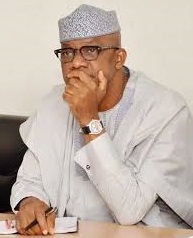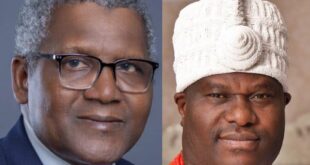Opinion:
By Balogun Ibrahim
On the evening of August 22, 2023, I received a call from my old friend, Adedunola Adele, which would lead to an intriguing discussion. Adedunola was concerned about the situation in Abeokuta, particularly regarding Nigeria’s Governor Prince Dapo Abiodun of Ogun State.
According to Adedunola, he had witnessed an unsettling event earlier that day: local government council chairmen prostrating before Governor Dapo Abiodun in what appeared to be a desperate plea for their rights.
This gesture came about as a result of allegations made by one of them, Hon. Wale Adedayo, Chairman, Ogun-East Local Government, accusing the governor of diverting funds intended for local councils for personal gain.
Mr. Adedayo’s accusation, made public in a letter addressed to former governor Olusegun Osoba, highlighted Governor Abiodun’s alleged withholding of statutory allocations from the federation accounts meant for local governments in Ogun State. This practice, he alleged had persisted since the governor took office in May 2019, crippling local governments and subjecting their officials to ridicule for their lack of performance.
Adedayo emphasized the dire consequences of this situation, including their loss in the 2023 elections, and he urged for urgent intervention to restore the constitutional allocation of funds to local governments.
He also alleged that the 10% of the state’s Internally Generated Revenue meant for local governments had not been disbursed since Governor Abiodun assumed office.
Moreover, Mr. Adedayo mentioned the alleged mismanagement of funds like the SURE-P (Subsidy Reinvestment and Empowerment Programme) and Ecological funds, further deepening the financial crisis at the local government level. The result was a significant loss of trust and respect among the citizens towards their elected officials.
It’s evident that in many Nigerian states, some governors operate with an emperor-like mentality, dominating their domains without question. For instance, they may delay or avoid conducting local government elections during their tenure, only to organize them as a mere facade as they approach the end of their terms.
In such cases, the judiciary and legislative branches often become subservient to the governor, and court orders can be disregarded without consequence. This situation leaves little room for checks and balances, allowing governors to wield unchecked power.
One striking example of this emperor-like behaviour was the video showing local government chairmen prostrating before Governor Abiodun, a spectacle that demeaned the third tier of government and shocked the public.
Furthermore, governors frequently divert federal funds meant for local governments to finance projects that don’t align with the intended purpose. This misallocation further exacerbates the crisis at the grassroots level.
The electorate must awaken to their constitutional rights and responsibilities. They have the power to recall non-performing lawmakers and challenge the impunity of their governors when necessary. It’s crucial to remember that governors are elected officials, not emperors, and should be held accountable for their actions.
The Federal Government also plays a pivotal role in addressing this issue. Scrapping state electoral commissions and giving responsibility for local government elections to the Independent National Electoral Commission (INEC) could reduce the influence of governors over these elections.
Also, anti-graft agencies like the Economic and Financial Crimes Commission (EFCC) need to establish well-equipped branches in states to deter public officers from engaging in corrupt practices. Financial autonomy for state judiciaries, state houses of assembly, and local governments, as stipulated in the Fourth Alteration Act, can further empower these institutions to function independently.
Against this backdrop, it is high time Nigerians recognized that governors should not operate as emperors. The electorate holds the power to demand accountability and transparency from their elected officials, ensuring that governance serves the interests of the people rather than a select few.
*Balogun Ibrahim writes in from Church Street, Ketu, Alapere, Lagos State.
 Startrend International Magazine For Your Latest News And Entertainment Gists
Startrend International Magazine For Your Latest News And Entertainment Gists





